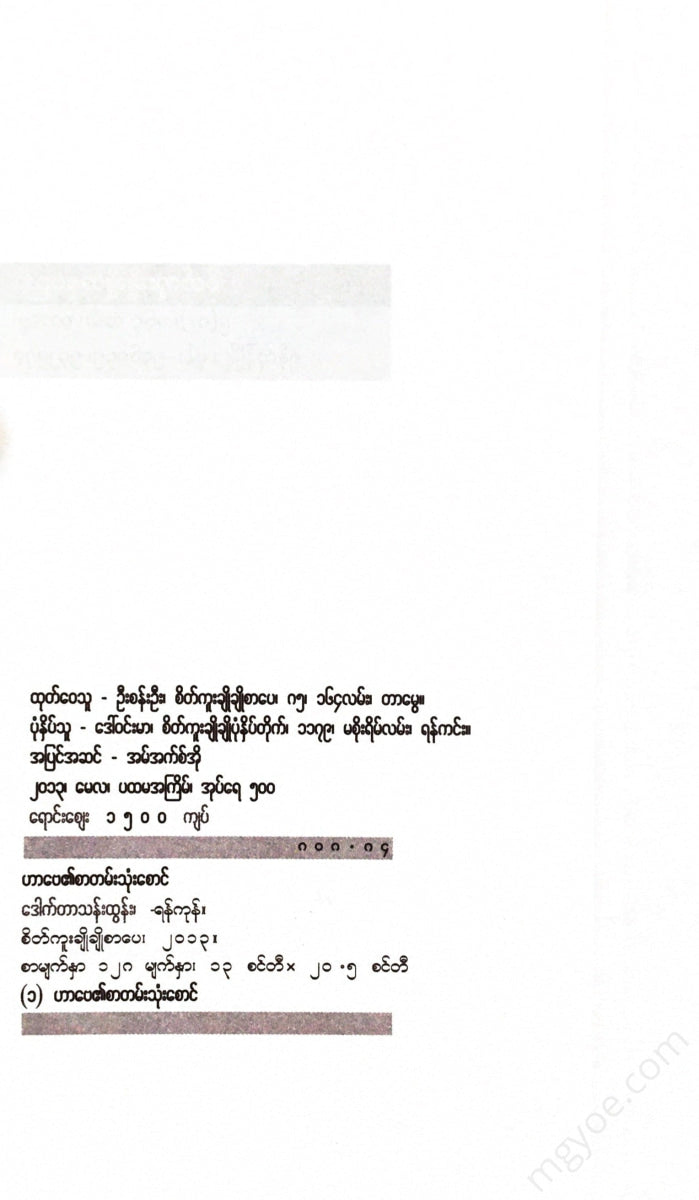စိတ်ကူးချိုချိုစာပေ
Dr. Than Tun - Three Papers of Harvey
Dr. Than Tun - Three Papers of Harvey
Couldn't load pickup availability
An Indian soldier (Sivay) captures Mandalay from Muni's father's side.
There is an inscription that says, "The soldiers board the ship." There is a wooden sculpture at the bow of the ship, which shows the princes dressed in full regalia. Harvey also wrote that he heard from U Pe Aung that a fake prince was standing at the bow of the ship leading the group that was sailing into Myanmar.
Although these letters were written in 1953, U Pe Aung died in 1926, so it is likely that Harvey had heard of the “Fake Prince” story long before.
Rudyard Kipling wrote several poems about some of the events of the "Peacekeeping" period, and many of the details are accurate, as they were reported by British soldiers who were involved in the peacekeeping. In the poem "The Head Falls", Kipling's description of his experiences is as follows:
Quiet Chester Day, widow
Crying for an only child
A tomb on the banks of the Pepin River
Avoid everything Burmese.
"Sergeant Prattewari" never said
Know the whole story.
Explosion from the bush
Laughter, running
First Scouts
The body of the colonel is already being picked up.
A large, dark bruise on his forehead.
The other side is empty.
Sergeant "Prat Tewari"
Corporal "Hira" and
Twenty with guns
I came to command the army.
The sun is starting to turn brown.
We walked along the riverbank.
"Sergeant Prattewari"
They fired their guns on his orders.
A dozen soldiers from this side of the village fence
Corporal "Hira"
Calling the rest of the army.
The other side of the flower is in the flower.
First scout soldiers
Scream and kill.
In a noisy crowd
Throw the "little diamond" here and there
Those who ran out of the village on the other side
The corporal's group was killed.
I couldn't finish it all morning.
The death list is endless.
The head that needs to be cut off is one hundred.
Ten heads, then two heads
They have returned to their commander's grave.
First scout soldiers
Every soldier carries a basket.
My hands are red too.
The village is also lit up with red lights.
Search for "Pepinmaw"
The basket is dripping.
Red grass along the road
A collection of souvenirs
There will be a tall person.
One head on top of another
They go and go, even the blindfolded ones.
Anger, pain, fear
On burnt flesh
It's visible.
Sergeant "Pratthewari"
Place his general's head on the great victory monument
His head is down.
A sword and a banner were also placed.
Let the world know and see whose match it is.
It is regrettable that I have to quote this terrible poem in full. But I want to show that Harvey deliberately withheld details about the period 1886 to 1890, which must be called the worst period in the history of Burmese-English relations. In a letter to the Pathein Commissioner, dated 7 November 1926, Harvey states that he had found the poem with the help of Captain ‘Lee Rok’ of the Survey of India. The unfortunate village was Pepin Maw, located at the confluence of the Pepin Chaung and the Ngawan River, and the following is the sworn statement of an old man from that village.
There was a small village in the place where the Buddha was buried and the temple was built. When the Burmese army attacked the village, a British officer was killed in the battle. The soldiers could not control their anger and opened fire on the soldiers with bombs and guns. The soldiers who were waiting in ambush from the village killed all the villagers who ran out of the village, leaving only the women and children. The heads of the dead were placed on the grave of the soldier.
Harvey's school history book for Burma was very successful in its intended purpose (1920/34) in terms of the use of the term "imperialism" in the education reports. The school history book written by "S.W. Box", a former education minister, was so uncomplicated in its imperialist propaganda that it was clearly written by an eighth grader, that it was rejected and replaced by Harvey's book.
Harvey's book, with its meticulous writing, scholarly style, and eye-catching illustrations, was like a wolf in the barnyard that was brought into the hands of university-level students. The book was widely used in schools across Burma, and students were taught everything about Burmese history in a colonial style.
U Po Kyar and U Ba Than have boldly written and published Burmese history books for schools, but they themselves have found that in many places they themselves are subject to the influence of Harvey. Since these books are written in Burmese and are only used in national schools (and not many people have read Harvey's books), the idea that we have been fooled by them is only growing in the minds of young Burmese scholars. "Ho" and "Kadei" have expanded on this and have even attacked King Thibaw and the pitiful Monsieur Hass with harsh words.























